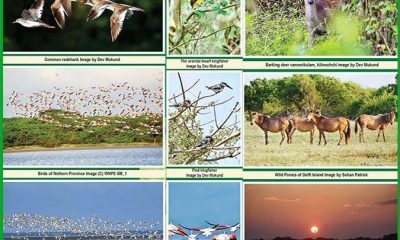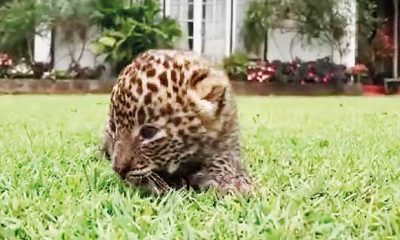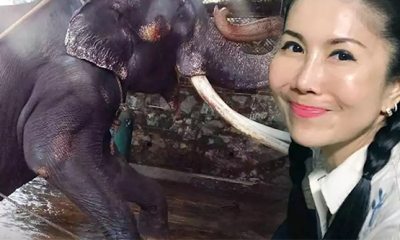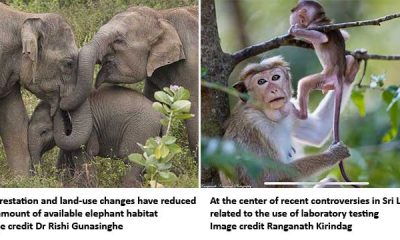News
Colombo asks India to send six bisons to reintroduce them in Lanka after 3 centuries
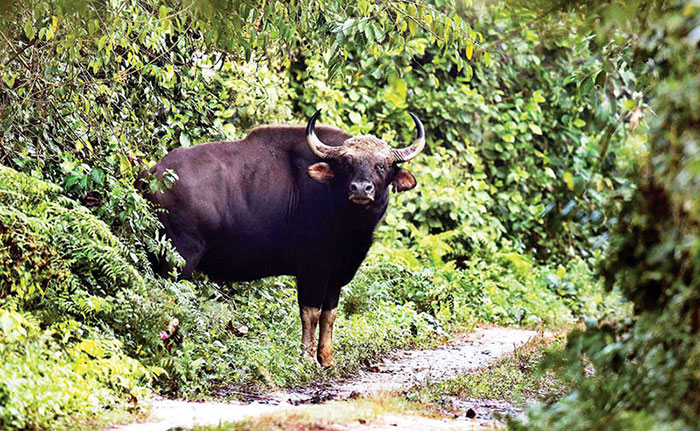
As wildlife diplomacy takes wing, government considers Lankan proposal for translocating gaurs
By Suhasini Haidar
and Jacob Koshy
New Delhi October 15, 2022: Close on the heels of the project that translocated cheetahs from Namibia, the Indian government is considering a proposal from Colombo to export a number of gaurs, or Indian bisons, to Sri Lanka to revive the population of gavaras that have been extinct in the island since the end of the 17th century. If the project is cleared, it would be the first such agreement between India and Sri Lanka, and part of a global trend of “wildlife or zoological diplomacy”, say experts.
Sources said the Ministry of External Affairs (MEA), which received the request in August, has now forwarded it to the Ministry of Environment and Forests (MoEF), “seeking comments” on the proposal to transport at least six specimens, including a bull and three to five cows. According to the written proposal, the Sri Lankan Department of Zoological Gardens would then carry out “captive breeding a herd of about a dozen specimens over a five-year period before trial reintroduction to the wild could take place in accordance with [internationally mandated] guidelines for reintroductions”.
S.P. Yadav, Director, National Tiger Conservation Authority, said the proposal was being studied. “We’ll have to evaluate if the conditions for translocation are right, such that the animal can sustainably thrive over there,” he told The Hindu, estimating the evaluation could take a few months.The suggestion for the proposal came from world-renowned Sri Lankan conservationist Rohan Pethiyagoda, who was awarded the Linnean medal 2022 (U.K. -based equivalent of the Nobel prize for zoology) for his work on restoring fresh water and forest biodiversity.
“As a scientific and cultural collaboration between our two countries, I felt this could be an immensely valuable initiative. But I know it is fraught with difficulties,” said Sri Lankan High Commissioner to India Milinda Moragoda who handed over the preliminary request on the basis of Mr. Pethiyagoda’s suggestion. “India is without a doubt Sri Lanka’s closest friend, supporter and trading partner. We have a shared history, shared cultural identity, and shared gene. We even got Buddhism, on whose traditions we derive our national values, from India,” he added.
Experts say that while “zoological diplomacy” had been practised worldwide, they draw a distinction between “gifts or loans” of animals in captivity to translocation and reintroduction of a species, particularly between neighbouring countries with similar eco-systems. For example, American bison herds were supplemented with animals from Canada after the U.S. herds were almost all wiped out, The U.K. has recently introduced the European bison (Wisent) after an estimated 10,000 years in June 2022(its extinct relative the Steppe Bison was believed to have lived there many centuries ago).
Israel has for decades pursued reintroductions, including of Persian fallow deer. Arabian oryx and other species have been released into the Negev desert, and South Africa has recently used the export of cheetahs to other African countries as a diplomatic tool during the post-apartheid era. More recently, Cambodia has requested translocating tigers from India, which is under consideration.
“Much depends on whether the conditions that caused the extinction have been removed, but reintroduction is known and has frequently been taken up between countries where the range is contiguous,” explained Mahesh Rangaran, Professor of History and Environmental Studies at Ashoka University who has studied conservation history, including such attempts. “In that sense, the animal plays a role as a zoological ambassador between nation states,” he added.
Sri Lankan officials say the gaur, called the gavara in Sinhala, was once widespread and archaeological remains in ancient caves in the island included the remains of the animal. By the end of the 17th century, however, the species appears to have been extirpated in Sri Lanka, although they remain prominent in iconography and mythological stories.The Indian gaur, a reclusive beast that lives in the wild, is the largest wild bovine that is a protected species and included in Schedule I of the Wild Life Protection Act, 1972 and listed as vulnerable in the International Union for Conservation of Nature (IUCN) Red List. There are about 13,000 to 30,000 gaurs in the world with approximately 85% of the population present in India. It is also found in Burma and Thailand.
The first-ever population estimation exercise of the Indian gaur carried out in the Nilgiris Forest Division in February 2020 estimated around 2,000 Indian gaurs to be inhabiting the division. This came after instances of people being attacked or injured by the bison primarily in and around plantations came to light. In 2019, for which the most recent numbers are available, three people were killed and seven injured in attacks by gaurs.
(The Hindu)
News
US sports envoys to Lanka to champion youth development

The U.S. Embassy in Colombo welcomed the U.S. Sports Envoys to Sri Lanka, former National Basketball Association (NBA) and Women’s National Basketball Association (WNBA) players Stephen Howard and Astou Ndiaye, from June 8 through 14.
The Public Diplomacy section of the U.S. Embassy said that it would launch a weeklong basketball program intended to harness the unifying power of sports, made possible through collaboration with Foundation of Goodness and IImpact Hoop Lab.
While in Sri Lanka, Howard and Ndiaye, both retired professional basketball players, will conduct a weeklong program, Hoops for Hope: Bridging Borders through Basketball. The Sports Envoys will lead basketball clinics and exhibition matches and engage in leadership sessions in Colombo and Southern Province for youth aged 14-18 from Northern, Uva, Eastern and Western Provinces, offering skills and leadership training both on and off the court. The U.S. Envoys will also share their expertise with the Sri Lanka Basketball Federation, national coaches, and players, furthering the development of basketball in the country. Beyond the clinics, they will collaborate with Sri Lankan schoolchildren to take part in a community service project in the Colombo area.
“We are so proud to welcome Stephen and Astou as our Sports Envoys to Sri Lanka, to build on the strong people-to-people connections between the United States and Sri Lanka,” said U.S. Ambassador Julie Chung. “The lessons that will be shared by our Sports Envoys – communication, teamwork, resilience, inclusion, and conflict resolution – are essential for leadership development, community building, equality, and peace. The U.S. Sports Envoy program is a testament to our belief that sports can be a powerful tool in promoting peace and unity.”
News
Rahuman questions sudden cancellation of leave of CEB employees

SJB Colombo District MP Mujibur Rahuman in parliament demanded to know from the government the reasons for CEB suspending the leave of all its employees until further notice from Thursday.
MP Rahuman said that the CEB has got an acting General Manager anew and the latter yesterday morning issued a circular suspending leave of all CEB employees with immediate effect until further notice.
“We demand that Minister Kanchana Wijesekera should explain this to the House. This circular was issued while this debate on the new Electricity Amendment Bill was pending. There are many who oppose this Bill. The Minister must tell parliament the reason for the urge to cancel the leave of CEB employees,” the MP said.However, Speaker Mahinda Yapa Abeywardena prevented Minister Wijesekera responding to the query and said that the matter raised by MP Rahuman was not relevant.
News
CIPM successfully concludes 8th Annual Symposium

The Chartered Institute of Personnel Management (CIPM) successfully concluded the 8th Annual CIPM Symposium, which took place on 31st May 2024. Themed “Nurturing the Human Element—Redefining HRM in a Rapidly Changing World,” the symposium underscored the pivotal role of human resource management (HRM) in today’s dynamic global landscape. Since its inception in 1959, CIPM has been dedicated to advancing the HR profession through education, professional development, and advocacy, solidifying its position as Sri Lanka’s leading professional body for HRM.
Ken Vijayakumar, the President of the CIPM, graced the occasion as the chief guest. The symposium commenced with the welcome address by the Chairperson, Prof. Arosha Adikaram, followed by the Web Launch of the Symposium Proceedings and Abstract Book by the CIPM President. The event featured distinguished addresses, including a speech by Chief Guest Ken Vijayakumar, President of CIPM, and an address by Guest of Honor Shakthi Ranatunga, Chief Operating Officer of MAS Holdings Pvt. Ltd., Sri Lanka.
The symposium also featured an inspiring keynote address by Prof. Mario Fernando, Professor of Management and Director of the Centre for Cross Cultural Management (CCCM) at the University of Wollongong, Australia.
Vote of Thanks of the inauguration session was delivered by Dr. Dillanjani Weeratunga, Symposium Co-chair.
The symposium served as a comprehensive platform for researchers to present their findings across a wide range of critical topics in HRM. These included Cultural Diversity and Inclusion, Talent Development and Retention, Ethical Leadership and Corporate Social Responsibility, Adapting to Technological Advancements, Mental Health and Well-being at Work, Global Workforce Challenges, Employee Empowerment, and Reskilling and Upskilling.
The plenary session was led by Prof. Wasantha Rajapakse. Certificates were awarded to the best paper presenters during the valedictory session, followed by a vote of thanks delivered by Kamani Perera, Manager of Research and Development.
The annual symposium of CIPM was a truly inclusive event, attracting a diverse audience that spanned undergraduates, graduates, working professionals, research scholars and lecturers. This widespread interest highlights the symposium’s significance in the field of HRM, offering a unique opportunity for everyone to network and learn from scholarly brains.The CIPM International Research Symposium was sponsored by Hambantota International Port, Sri Lanka Institute of Information Technology (SLIIT), E B Creasy & Co. PLC, and Print Xcel Company.




